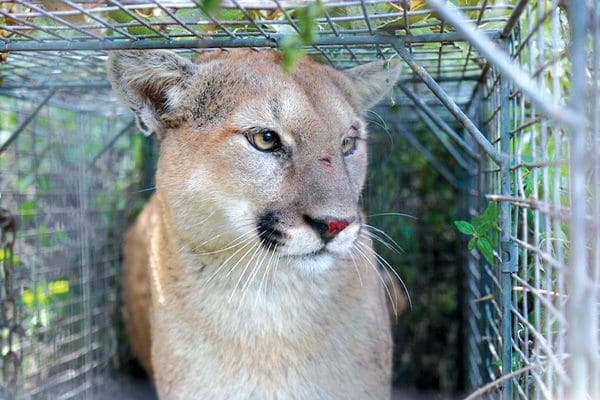The Santa Monica Mountains, which stretch 150,000 acres from Pt. Mugu to the Hollywood Hills and from the ocean to the Conejo and San Fernando valleys, is reportedly down to one known and tracked adult male mountain lion as of February, after the legal slaying of the big cat known as P-56.
The death of P-56—one of the last remaining male mountain lions among the pumas being tracked by the National Park Service in a years-long study of mountain lions in the area that began in 2002—has elicited concern from ecologists and an outcry among residents.
“The loss of a breeding male is a concern for the study, especially when the population is already very small,” Jeff Sikich, the lead field biologist for the project, said in a statement provided by the Santa Monica Mountains National Recreation Area (SMMNRA). “There are always animals out there that are not being tracked. Currently, there is only one adult male in the Santa Monica Mountains that we are tracking and that is P-63.”
P-56 was shot and killed by an unidentified landowner whose livestock had fallen victim to the cat in nine separate attacks over the past two years, according to information shared by the SMMNRA. The permit for the cat’s slaying was issued by the California Department of Fish and Wildlife (CDFW), under a three-strikes policy that had been in place since December 2017.
The lion was killed on Jan. 27 in the western part of the Santa Monica Mountains in Ventura County near Camarillo, according to the SMMNRA’s information.
SMMNRA information stated that, according to information given to them by the CDFW, the landowner used tactics to protect livestock from P-56, including “bringing in as many livestock as possible, penning any remaining livestock close to the barn and houses, and utilizing trained guard dogs, hot wire fencing, motion activated lights and auditory (radio) hazing. The property owner took these measures even though incidents involving P-56 took place outside the boundary of the current geographic area for the three-strikes policy. Over two years, this property owner had nine depredation incidents resulting in the loss of 12 animals.”
In addition to conflicts with homeowners and ranchers, the population of mountain lions in the local mountains has faced the additional challenges of habitat fragmentation by Los Angeles’ massive network of freeways as well as the continued use of anticoagulant rodenticide—rat poison that commonly makes its way up the food chain to poison apex predators such as mountain lions and hawks.
Four adult mountain lions had been found dead in the mountains in the first 10 months of 2019, according to an October press release issued by the SMMNRA. Three of those killed last year were adult males; one was an adult female. Two were thought to have been killed by poison; one was struck and killed crossing an area freeway; one had been illegally shot in the head.
Joel and Kian Schulman, a local Malibu couple who founded the nonprofit Poison Free Malibu, calling for local lawmakers to reverse the 2017 policy allowing for depredation (kill) permits to be issued for mountain lions by the CDFW.
“Logically, this cannot be allowed. The reason is that there is nothing to stop the next mountain lion from naturally following its instinct to eat the vulnerable poorly protected sheep, and then shot in turn,” a letter addressed to local legislators State Senator Henry Stern and Assemblymember Richard Bloom and signed by the Schulmans stated, later adding, “The Santa Monica Mountains, with its very fragile mountain lion population, is just not the place to raise livestock without totally secure enclosures.”
The full text of that letter can be found in the opinion section on page A6 in the newspaper. The online version will be linked shortly.

